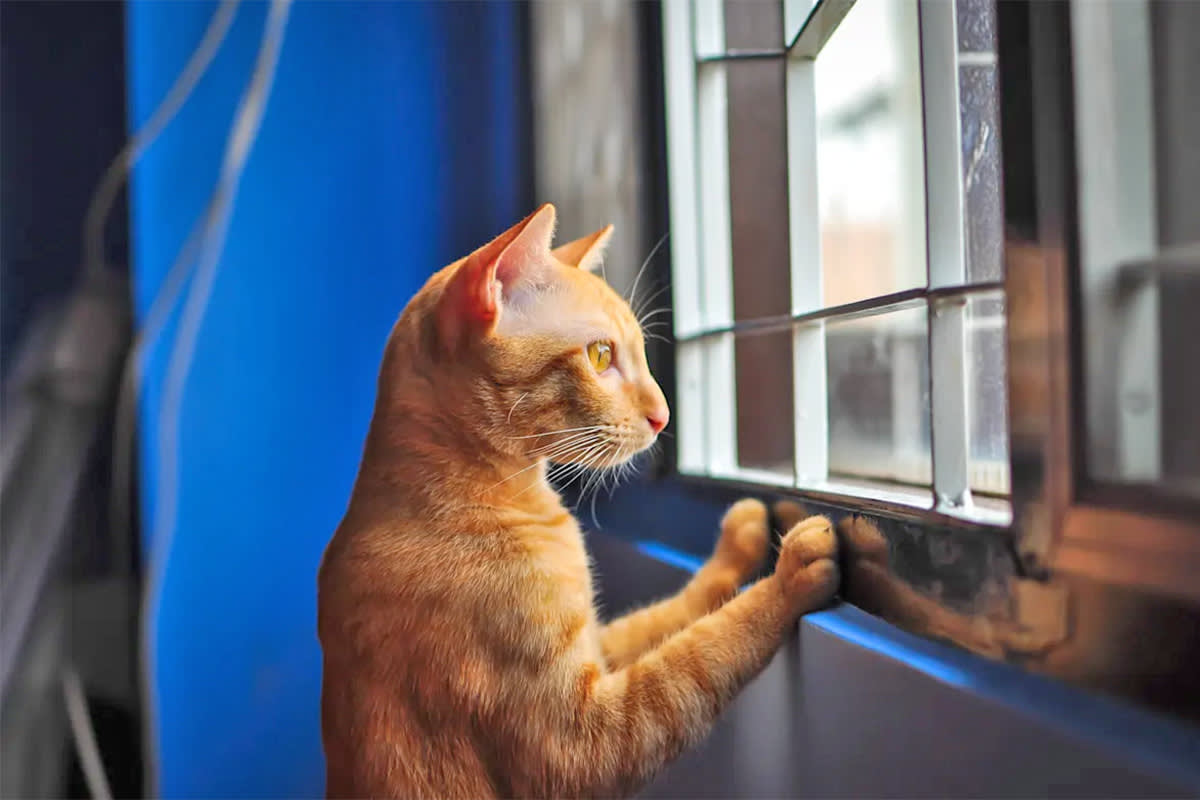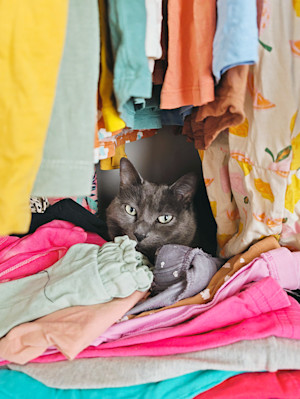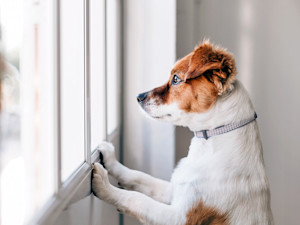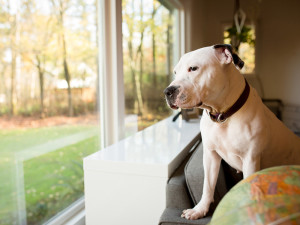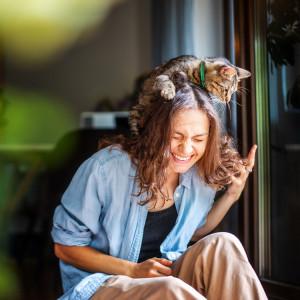Pets Experience Empty-Nest Syndrome, Too
Kids of any age, really, going back to school can can have an affect on your pet.

Share Article
After I left for college, my cat turned on me.
When I was in eighth grade, I found ’Stache — named for her markings that resembled a milk mustache — outside of my grandparents’ house in Tulsa, Oklahoma, and somehow suckered my parents into bringing her with us to our house in Texas. She successfully met our other cat, Sydney, and quickly made herself at home.
We were pals. She was a sweet cat to everyone, but we were especially close, and I continue to treasure our memories. Like rolling on the floor of my room while she played with my ponytail. Like waking up to her head on my cheek and feeling a deep love and connection with this sweet little gray-and-white cat. When I left for college in Missouri five years later, I was prepared for the move; she was not.
When I came home for Thanksgiving freshman year, everything was fine with ’Stache. But during all of my subsequent visits, she went scorched earth on me: When I came home for school breaks, and later as an adult, she would run, hissing and crouching low as she went.

Certified cat behaviorist Rita Reimersopens in new tab laments “that was a big change for her.”
Reimers has encountered numerous anxious cats during her 17 years of owning a pet-sitting business and additional years of cat training, estimating that about 20 percent of cats experience separation anxiety, but the rates are higher if they’re older. In a case like this, she recommends letting the cat decide to come to you. “The more that it’s forced and the more you try to get the cat to like you, the worse it’s going to be.”
Cats are very cautious by nature, because they’re in the middle of the food chain as both predators and prey, Reimers explains. Some cats are more naturally prone to anxiety, especially if they were born outside or if their mom was feral.
What are some signs of separation anxiety?
In cats, separation anxiety looks like them slinking low to the ground, turning their back toward their human, or even becoming aggressive toward a pet sitter. It’s also common for them to chew themselves or pull out their own fur, Reimers says.
High-anxiety cats also tend to pee outside of the litter box, and Reimers adds that they are more prone to interstitial cystitis. While this is not an infection, like a urinary tract infection, they have the urge to pee. Reimers recommends Palmitoylethanolamide (PEA) to help with the interstitial cystitis, as well as calming aids such as silvervine, Convivial Housecatopens in new tab, and Solensiaopens in new tab.
For dogs, separation anxiety can have some similar symptoms. Khris Ericksonopens in new tab, a canine trainer and behavior specialist focusing on separation anxiety, says that dogs will typically bark, howl, or whine, scratch at doors or chew on doorframes, pant and drool, pace, and have accidents that happen only when they’re left alone.
Also similarly to cats, Erickson cites research from the Journal of Veterinary Behavioropens in new tab that found 17.2 percent of dogs experience some form of separation anxietyopens in new tab, ranging from anxiety immediately after departure to symptoms showing up a few days after their person leaves. This can also happen when a small child goes back to school, even if they aren’t headed off to college.
How can pet parents ease the symptoms for their pets experiencing separation anxiety?
When a pet’s best friend goes away, they don’t understand what’s happening. Maintaining routine, having another person they’ve bonded with, and having their favorite comforts available to them will go a long way.
For dogs, Erickson advises keeping the dog in a space that is comfortable and familiar. “If you’re going to confine your dog to a certain area of the house or to a crate, then you need to put in the time to make that space a safe and comfortable place for them,” she says. This might take a few weeks of training to get them used to the space.
Reimers recommends keeping the college student’s room available to the pet because it smells like their person. “Don’t change your bedding; let it smell like you because it will bring them comfort,” she says.
Cats especially don’t like change to routine, Reimers says. In the wild, cat colonies do the same thing at the same time every day, so they know to be on alert if something different is happening.
Both cats and dogs do better when they have their physical and mental needs met. Both sources for this story recommend play and regular exercise. Erikson mentions that feeding part of a dog's meal in a puzzle toy, snuffle mat, or lick mat to have an outlet for more of their normal dog behaviors of chewing, sniffing, and seeking.
“Many behavior issues are caused by or contribute to behavioral issues,” Erikson says. Meeting their natural needs will go a long way in managing their separation anxiety.
For cats, Reimers says that having a family member or friend also establish a bond and a routine with the cat will help ease their anxiety. One tip is to encourage others bonding with the cat to use the same phrases and specific inflections their favorite person uses, especially around mealtimes.
When the cat’s favorite personopens in new tab is back, be sure to have them talk sweetly and offer treats. Consider having a change of clothes that have been at the house, too, because they will smell different. “It’s not you, but it’s those new smells you’re introducing to the house,” Reimers says.
In the end, “be mindful that the kitty is going to be a little upset,” but pet parents have these tools to help them manage.

Lauren Dixon
Lauren Dixon is a journalist based in Chicago. She has work published in Block Club Chicago, The Chicago School’s Insight, and Chief Learning Officer, among other places. Besides pet parenting and pet behavior, she covers technology and the staffing industry. She is the proud mom of a disabled but unstoppable calico kitty named Sookie and an anxious Cattle Dog mix, Spider-Man. (No, they are not friends.)
Related articles
![Golden Retrieve dog running in the grass outside, playfully chasing a flirt pole held by a man in blue jeans]()
How to Tell if Your Dog Is Bored
Get out the toys and puzzles.
![Cute grey cat laying down in a closet.]()
Your Cat Isn’t Really Comforted by Items With Your Scent on Them, Study Says
Leaving them with your old shirt is nice and all, but other things may work better.
![Sad dog waiting by the window at home.]()
8 Things Our Dogs Are Really Doing While We’re Away
Is it like The Secret Life of Pets, or what?
![Muscular white pit bull stands on couch, looking out window to sunny fall day.]()
Separation Anxiety in Dogs
Does your dog freak out when you head for the door? Here’s some advice.
Why Is Your Dog Crying?
Get the tissues...
Why Is My Cat Suddenly Clingy?
They’re never far away, but you’d like a little distance.
